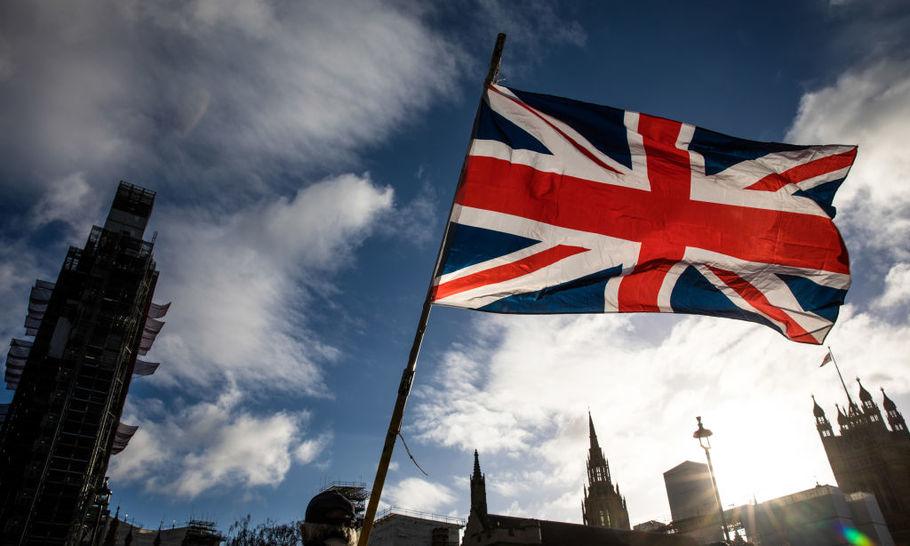While Parliament rejoices in its omnipotence, the nation sees only its impotence

A pro-Brexit demonstrator waves a British Union Flag, also known as a Union Jack, outside the Houses of Parliament in London, U.K., on Monday, Jan....
“Whom the gods would destroy, they first make mad.” This week’s Supreme Court ruling was supposed to restore reason and sanity by rendering the “unlawful” prorogation of Parliament “null and void”. But the return of the Commons yesterday was marked by new depths of mutual hostility.
Amid scenes of barely repressed fury, the Government showed no contrition, but instead hurled accusations of cowardice at the Opposition, which responded by calling for the Prime Minister not merely to resign but to be impeached. Although it eschewed such language, the Supreme Court’s judgement seems to have had the effect of legitimising this political polarisation. In the eyes of half the Commons, Boris Johnson is now no better than a criminal; for the other half, he is a tribune of the people.
What do those outside the chamber make of it all? There is a consensus among long-standing observers of Westminster that, as the BBC’s Nick Robinson put it, “I have never seen the House of Commons so angry. Nor have I ever seen a Prime Minister whom so clearly believes that the rage of his opponents works for him.”
Andrew Neil, who has emerged as the only interrogator on the BBC who is equally rigorous with all parties, spoke of a “zombie Parliament” pitted against a “zombie Government”. Interviewed by Neil, Robert Jenrick, the Housing and Communities Secretary, refused to say whether the Government would support a vote of no confidence in itself, while Nick Thomas-Symonds, the Shadow Solicitor General, refused to explain how Labour’s proposed abolition of private schools could avoid breaking the law. If these two MPs are typical of their respective sides of the House, the Attorney General, Geoffrey Cox, was extreme but not inaccurate when he told MPs: “This is a dead Parliament.” Only he might well have added, “And a dead Government too”.
Laura Kuenssberg, the BBC’s Political Editor, was visibly shocked that the Prime Minister dismissed as “humbug” the charge of Paula Sherriff, a neighbour and friend of the murdered MP Jo Cox, that his language was “dangerous”. She has struggled to maintain balance, but could not refrain from asking whether “even many Tory MPs might be comfortable defending this”.
What of the experts? Professor Matthew Goodwin, the shrewdest academic writer on populism, sees the conflict as one between the political class and the rest: “Brexit was always destined to bring us here — to crisis. The vote to Leave was the first moment in our national history when a majority of people outside of Parliament asked for something that the majority of people inside Parliament did not want to give.”
In an LBC interview with Iain Dale, David Starkey argues that the British constitution is now “broken” as a result of the Supreme Court’s judgement, which he as a historian considers profoundly mistaken. Pointing out that the justices relied on abstract principles rather than precedent, Starkey suggests that the whole concept of the separation of powers, the basis for the Court’s intervention and indeed its own existence, is alien to the English legal tradition — an imported theory from France, concocted by Montesquieu. The whole point of the British system is that the executive sits in, and is an integral part of, the legislature — and until Tony Blair turned the Lord Chancellor into a Justice Secretary and the Law Lords into a Supreme Court, so did the judiciary. Starkey traces the mischief back to the campaign of Charter 88, which has now completed its long march through the institutions. But it is far too late to reverse this constitutional revolution.
Parliament has never seemed more determined to assert its ascendancy over the Government, yet it has rarely been held lower in public esteem. The country is crying out for leadership, not for a talking shop that is fast resembling a saloon bar on a Saturday night. While Parliament rejoices in its omnipotence, the nation sees only its impotence.
The entire British establishment appears to be in the grip of a collective nervous breakdown. There is no known cure, but the most effective remedy in the past has always been a general election.





